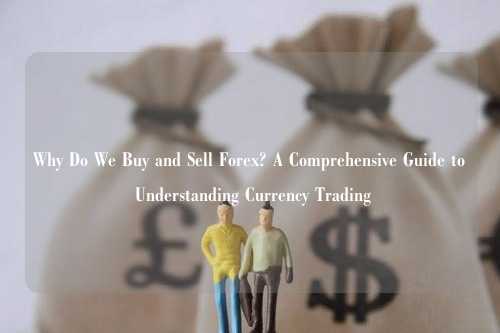Why Do We Buy and Sell Forex? A Comprehensive Guide to Understanding Currency Trading
Why Do We Buy and Sell Forex? A Comprehensive Guide to Understanding Currency Trading
Have you ever wondered why people trade currencies? What drives the massive daily transactions in the foreign exchange market? If you're new to the world of forex, these questions might seem overwhelming. But don’t worry—I’m here to break it down for you in a way that’s easy to understand. Let’s dive into the fascinating world of forex trading and explore why buying and selling currencies is such a big deal.
What Is Forex Trading, Anyway?
Forex, short for foreign exchange, is the global marketplace where currencies are traded. It’s the largest financial market in the world, with trillions of dollars exchanged every day. But why do people buy and sell currencies in the first place? The reasons are as diverse as the traders themselves.

1. Facilitating International Trade
One of the primary reasons for forex trading is to facilitate international trade. Imagine a company in the United States wants to import goods from Japan. The Japanese supplier will likely want to be paid in yen, while the American company operates in dollars. To make this transaction happen, the U.S. company needs to exchange dollars for yen. This is where forex trading comes into play.
Without the ability to buy and sell currencies, global trade would grind to a halt. Forex trading ensures that businesses can operate seamlessly across borders, making it a cornerstone of the global economy.
2. Speculation: The Art of Predicting Currency Movements
Another major reason people trade forex is speculation. Traders buy and sell currencies with the goal of profiting from fluctuations in exchange rates. For example, if a trader believes the euro will strengthen against the U.S. dollar, they might buy euros now and sell them later at a higher price.
Speculation is what makes the forex market so dynamic. It’s a high-risk, high-reward game that attracts everyone from individual retail traders to large financial institutions. But remember, while the potential for profit is significant, so is the risk of loss.
3. Hedging: Protecting Against Currency Risk
For businesses and investors, forex trading isn’t just about making money—it’s also about protecting it. This is where hedging comes in. Companies that operate internationally often face the risk of currency fluctuations impacting their profits. By trading forex, they can hedge against these risks.
For example, if a European company expects to receive payment in U.S. dollars in six months, they might worry that the dollar will weaken by then. To protect themselves, they could enter into a forex contract that locks in the current exchange rate, ensuring they won’t lose money if the dollar drops.
4. Central Banks and Government Policies
Central banks play a crucial role in the forex market. They buy and sell currencies to stabilize their own currency’s value or to influence their country’s economy. For instance, if a country’s currency is too strong, its exports might become too expensive for foreign buyers. To address this, the central bank might sell its currency to weaken its value.
Government policies, such as interest rate changes, also impact forex trading. Higher interest rates can attract foreign investors, increasing demand for the currency and driving up its value. Understanding these dynamics is key to navigating the forex market.
5. Tourism and Personal Transactions
On a smaller scale, forex trading is also essential for individuals. If you’ve ever traveled abroad, you’ve likely exchanged your home currency for the local currency. This is a simple form of forex trading. Similarly, people who send money internationally or make purchases in foreign currencies rely on the forex market to get the best exchange rates.
Common Questions About Forex Trading
You might be wondering: Is forex trading only for experts? Not at all! While it’s true that forex trading requires knowledge and strategy, it’s accessible to anyone willing to learn. Many online platforms offer educational resources and demo accounts, allowing beginners to practice without risking real money.
Another common question is: How much money do I need to start trading forex? The answer varies. Some brokers allow you to start with as little as $100, while others require larger deposits. It’s important to choose a broker that aligns with your financial goals and risk tolerance.
Final Thoughts
Forex trading is more than just buying and selling currencies—it’s a vital part of the global economy. Whether you’re a business owner, an investor, or just someone planning a vacation abroad, understanding forex can help you make smarter financial decisions.
So, the next time you hear about the euro rising or the dollar falling, you’ll know exactly why it matters. And who knows? With a bit of research and practice, you might even find yourself joining the ranks of forex traders worldwide.
